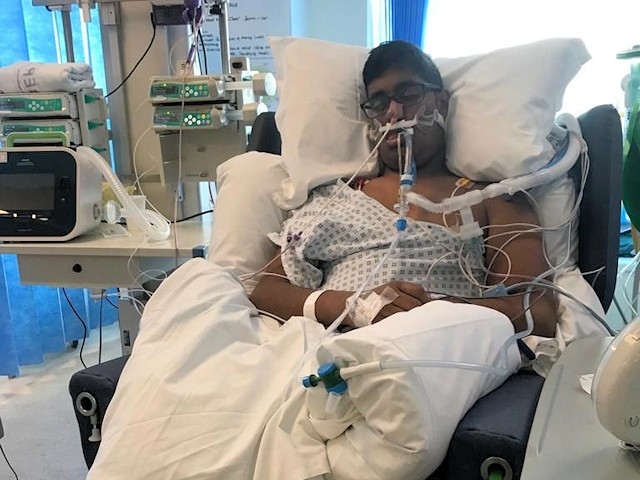Parents urged to warn student children don’t assume it’s Covid if they fall ill at university
Date published: 31 August 2020

19-year-old Ben de Souza contracted meningococcal B last year
Parents of UK students are being urged to ensure their children don’t confuse Covid-19 with other killer diseases such as meningitis. The message, from the meningitis charity, Meningitis Now, comes as thousands of young people prepare to leave home for university for the first time.
With as many as half a million students setting up home, often in halls of residence, in the coming months, many universities will be expecting the usual health issues such as fresher’s flu and hangovers to be complicated by Covid-19 this year and all will be taking measures to help prevent it.
“But what about meningitis?” says Dr Tom Nutt, CEO at Meningitis Now.
“The harsh reality is that some students will contract meningitis whilst at uniersity this coming autumn and how easy will it be to put a headache and feeling unwell down to Covid-19 and self-isolate? And whilst this is the correct response for Covid-19, it could be disastrous if the illness is meningitis. When meningitis strikes it does so quickly and any delay in diagnosis or treatment can cost lives.
“Our message to parents as they battle with the uncertainties of university starting dates, online tutorials, and living arrangements, is to be certain about meningitis and to ensure that their children are aware of the signs and symptoms of meningitis and that if they are feeling unwell they shouldn’t simply assume it's Covid-19 or a hangover and that they should seek medical help immediately by calling NHS 111 or their GP.”
Common signs of meningitis and septicaemia/sepsis
Meningitis symptoms can appear in any order. Some may not appear at all. Common symptoms of meningitis can include:
- Fever, cold hands and feet
- Vomiting
- Drowsy, difficult to wake
- Confusion and irritability
- Severe muscle pain
- Pale, blotchy skin
- Spots/rash
- Severe headache
- Stiff neck
- Dislike bright lights
- Convulsions/seizures
Early symptoms can include; fever, headache, vomiting, muscle pain and fever with cold hands and feet. Someone with meningitis or septicaemia can get a lot worse very quickly.
Nineteen-year-old Ben, a student at the University of Portsmouth knows how quickly meningitis can strike having contracted meningococcal B in November 2019. Keen to pursue a career as a Naval Officer, Ben was just one month into college when he became unwell, disorientated, and confused. He was told that it was a hangover. Ben, who had been given the MenACWY vaccine, had contracted MenB - a strain of the disease he was not vaccinated against. The quick thinking and speedy action of his flatmates saved his life.
“Being told that our son was the sickest patient in the hospital, will live with me forever,” says Ben’s mother, Arlene de Souza.
“The outcome for Ben could have been very different if he and his mates had also been dealing with the added confusion of Covid-19. Ben has been lucky.”
Ben has now recovered fully and intends to restart his university studies this autumn.
The student environment is the perfect breeding ground for diseases such as meningitis, as large groups of people start to cohabit and mix for the first time - some of whom will unknowingly be carrying the bug that causes this disease. This is further exacerbated by the fact that up to a quarter of 15 to 24-year-olds carry meningococcal bacteria in the back of their throats, compared to one in 10 of the general population.
Whilst many students going to university or college this year are likely to have been protected against MenACWY, having received the vaccine at school, up to half a million people aged up to the age of 25 may have missed this important jab, and very few will have been vaccinated against MenB - a strain that causes most cases of bacterial meningitis in the UK.
Meningitis and septicaemia facts
- Meningitis is inflammation of the membranes that surround and protect the brain and spinal cord; usually caused by bacteria or viruses.
- Some bacteria that cause meningitis can also cause septicaemia.
- Meningitis Now estimates that there are currently around 2,000 cases of bacterial meningitis in the UK and 6,000 cases of viral meningitis each year – equivalent to 22 a day.
- Certain age groups are more susceptible - the under 5s are most at risk, particularly those under the age of one; teenagers and young adults and older adults, particularly those over 65.
- Many people who contract meningitis and septicaemia will make a good recovery, but some will suffer physical, neurological and psychological after-effects.
Do you have a story for us?
Let us know by emailing news@rochdaleonline.co.uk
All contact will be treated in confidence.
Most Viewed News Stories
- 1The plan for two new apartment blocks with an unusual car parking system
- 2Andy Burnham responds to harrowing reports from hospital nurses
- 3Police seize £48,000 in Rochdale property search
- 4The museum undergoing £8.5m transformation now needs a new roof
- 5Residents urged to be vigilant after spike in Shawclough burglaries
To contact the Rochdale Online news desk, email news@rochdaleonline.co.uk or visit our news submission page.
To get the latest news on your desktop or mobile, follow Rochdale Online on Twitter and Facebook.

